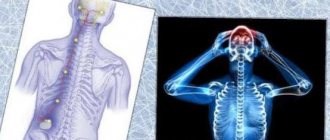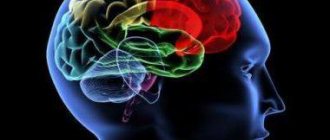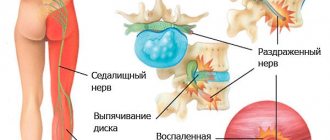Asthenia is a complex of symptoms associated with increased weakness, chronic fatigue syndrome, physical and mental exhaustion. In half of the cases, the disorder goes away after proper rest, but often this is not enough. If fatigue occurs for a long time, you should consult a therapist as soon as possible.
Asthenia is a disease accompanied by symptoms of weakness, physical and mental exhaustion. It is also called asthenic condition or asthenic syndrome. Literally translated from Greek, the word means “powerlessness,” which accurately reflects one of its characteristic symptoms.
Asthenia is not always a disease. It manifests itself in 3 forms:
- One of the main symptoms of overwork in the body. If a person gets tired quickly, has weakness, mood swings, increased sensitivity to bright lighting and loud sounds, immediate rest is indicated. after which the body is completely restored.
- The body's protective reaction is the response of the nervous system to the strong effects of one or more stimuli. For example, in case of severe overwork, a person stops assimilating information, his head is buzzing, which is quite normal. After proper rest, the body will recover again.
A symptom of a dangerous pathology - diabetes mellitus, liver or kidney failure. The syndrome may be associated with oncological pathologies, schizophrenia and other mental illnesses. Such conditions are accompanied by various symptoms, including inattention, irritability, drowsiness, headache, etc.
What is asthenic syndrome
Asthenic syndrome in adults
may have the following characteristics:
- First of all, it is an indicator of fatigue and overstrain. In the case of hard work, several jobs, or having to overwork, working at night, then in the morning there is a feeling of fatigue, weakness, decreased mood, sensitivity to smells and bright lighting, decreased endurance to usual stress, the appearance of headaches or exacerbation of migraines. This condition usually goes away after proper sleep and rest, excluding external stimuli.
- The reaction of the nervous system is of the “protective” type. This is a process that was inherent in our body during the process of evolution, helping to protect our mental processes from reboot due to the influence of various external and internal factors. It is based on the extreme inhibition reflex. This mechanism is triggered upon the occurrence of asthenia, when a threat to the body arises. An example is when a student is preparing for an exam and tries to study the materials for the entire semester on the last evening, then absent-mindedness, decreased concentration, headache, etc. occur. Thus, asthenia occurs as a defensive reaction notifying the body of a possible threat.
- Diseases. An asthenic state
also occurs with the development of certain diseases of the cardiovascular, endocrine systems, oncopathology, mental disorders, etc.
For example, the first stages of the disease with acute viral infections are indicative, when weakness, fatigue, drowsiness and irritability occur even before the body temperature rises and other characteristic symptoms appear. For some conditions, on the contrary, only signs of asthenia : hypertensive crisis, mild concussion, recovery from anesthesia. Most diseases still begin with asthenia and continue with the development of other symptoms. And during recovery, asthenia is still possible. Asthenic disorder
in adult women often accompanies premenstrual syndrome.
From all of the above, we can conclude that often asthenia, what it is, symptoms in women
, occurs due to overwork or somatic pathology. And it arises due to the reaction of the nervous system. In this case, asthenia is a state of reboot, and asthenic syndrome is a disease.
symptoms of asthenia
Main causes of asthenia
The main causes of asthenia may be excessive care for loved ones, excessive attention to children and problems related, including work. According to statistics, people suffering from asthenia talk about physical and mental fatigue, and women are most susceptible to it.
Causes of asthenia
If you feel these symptoms, it is very likely that you have asthenia.
But what causes this tired feeling in your body? There are many possible causes that can be classified as functional or organic. Asthenia of organic origin.
This is a feeling of fatigue caused by other underlying diseases. In general, it appears at the end of the day and does not change for some time, there is always fatigue there.
Possible reasons may include:
- infections;
- anemia (decreased hemoglobin concentration in the blood);
- hypothyroidism (poor functioning of the thyroid gland);
- medications (benzodiazepines, antiallergic drugs, medications to lower blood pressure);
- pregnancy;
- neurological diseases such as multiple sclerosis;
- cardiovascular diseases;
- cancer;
- apnea syndrome;
- lupus;
- Addison's disease.
Asthenia of functional origin.
This may be due to excessive work, intense intellectual activity, insufficient rest, few hours of sleep, unhealthy habits (smoking, alcoholism, use of stimulants, etc.), studying for exams, competitive sports or any situation that causes intense and constant stress. In these cases, the recommended treatment in general is reducing work and increasing rest hours, eliminating harmful stimuli, defragmenting situations, and maintaining a healthy lifestyle.
In general, asthenia of functional origin appears in the early hours of the day and changes over time. This means that maybe after a few days you will feel good, and then on other days you will feel exhausted again, and so the cycle repeats. On the other hand, in some cases, asthenia of functional origin appears before the seasonal climate. In these cases, this is not relevant, since the fatigue is moderate and lasts a short time.
Other causes of asthenia.
Asthenia can also occur due to mental illnesses such as depression. If this is your case, then treatment with antidepressants or other psychotropic drugs may help eliminate asthenia.
Psychological therapy is also a good option for combating fatigue.
Characteristic symptoms
Asthenia symptoms
: feeling of fatigue, malaise, and fatigue persists even after rest. Problems with concentration, absent-mindedness, difficulties in learning new material, forgetfulness, the essence of thinking and communication is easily lost, increased sensitivity and tearfulness.
Light and photophobia, hypersensitivity to sounds, smell and taste. Sleep disturbance (drowsiness during the day, poor quality of sleep at night, difficulty falling asleep, or, conversely, unusually long sleep duration).
Headaches and dizziness also occur.
Characterized by the appearance of intolerance to stuffy space, fluctuations in pulse, blood pressure, sweating, shortness of breath.
Increased feeling of anxiety.
Unpleasant sensations in different parts of the body.
What to do if asthenia occurs?
First of all, it is necessary to exclude all external stimuli. In most cases, this is the most effective method of eliminating asthenic manifestations
.
If asthenia is a manifestation of a pathological process in the body, then additional consultation with a doctor will be required to detect abnormalities in the body, conduct diagnostics, obtain reliable data on the state of health and prescribe the necessary treatment.
asthenic syndrome signs
What is asthenia
Asthenic syndrome is a multicomponent psychopathological disorder prone to inconspicuous progression. The pathological condition is regarded as the most common syndrome. It accompanies most diseases, and in some cases precedes their development.
In his practice, almost every doctor encounters asthenic syndrome. Pathologies accompanied by this psychopathological disorder are divided into three groups:
- Infectious diseases - including influenza, ARVI, tuberculosis, infectious lesions of the gastrointestinal tract, various viral pathologies.
- Somatic – any diseases that develop under the influence of external factors. Among them, the most common are: peptic ulcer of the stomach and duodenum, gastritis, enterocolitis, arrhythmia, hypertension.
- Conditions requiring restoration of the body - after childbirth, injuries and injuries, after surgery. Each of the mentioned factors is a strong stress for the body, against the background of which asthenia can develop.
The development of asthenia is explained by physiological processes that occur in the body during the period of illness or at stages preceding the onset of the disease. Clinical signs can be barely noticeable or acutely expressed (in the latter case, treatment of asthenia in Moscow is especially important). Most patients experience increased fatigue, general exhaustion of the body, mood swings, and sleep disturbances.
Treatment of asthenic syndrome
Treatment of asthenia symptoms
complex and aimed at eliminating the causes and restoring the functions of the nervous system. The following methods are used:
- Elimination of external irritants.
- Drug treatment.
- Application of psychotherapy for asthenic syndrome.
- Physiotherapeutic methods.
- Diet and balanced nutrition.
- Massage and physical therapy.
Timely diagnosis and treatment of this condition are the main factors in maintaining mental health, and at the same time physical and social functions of a person.
How is asthenia diagnosed?
Your doctor will definitely ask you a lot of questions about your symptoms. To rule out an organic cause, you will need to do some blood and urine tests. If there are no organic reasons, then, of course, this is functional asthenia. The doctor will try to find out, based on the data you give him, what is the cause of your fatigue, and guide the treatment correctly.
Spring asthenia.
This is a special case of asthenia, which usually appears towards the end of winter or the beginning of spring. Symptoms are usually mild and short-lived, but it should be noted that this is not a psychiatric disorder. It's simply a feeling of tiredness that can be attributed to changes in hormones and neurotransmitters.
When a seasonal change occurs, temperatures and hours of sunlight increase. This causes changes in the functioning of the hypothalamus, the nerve center in the brain responsible for controlling sleep, wakefulness, appetite, thirst and body temperature. Changes in the functioning of the hypothalamus will be responsible for spring asthenia.
Why doesn't this affect all people?
Well, it may simply be due to a factor unique to each individual, a factor that has not yet been identified. Some people may be more sensitive or more likely to notice these climate changes.
This can be a situation similar to allergies: in the spring, many people suffer from asthma or rhinitis due to pollen in the air, while others have no effect on them. How to avoid spring asthenia.
Living a healthy lifestyle and eating a balanced diet are factors that can help you feel better and keep your body and mind energized.
Here are some basic tips to prevent spring asthenia:
- Be sure to include three daily servings of fresh vegetables and two servings of fruit in your diet.
- It is also important to eat moderate amounts of carbohydrates (pasta, rice, legumes, potatoes) and meat. Drink at least two liters of water daily. Have a good rest.
- Most people need seven or eight hours of sleep every day to function properly in their daily activities.
- Leave bad habits. Do not smoke, drink coffee, alcohol or other stimulant drinks late in the day.
- Do moderate exercise. Walking 20 or 30 minutes daily will make you feel more energetic.
- Go to bed and get up at the same time and don't skip meals.
- In some cases, taking vitamins and minerals may be necessary to combat asthenia, but this should always be prescribed by a doctor. However, keep in mind that excess vitamin intake can have very negative consequences.










